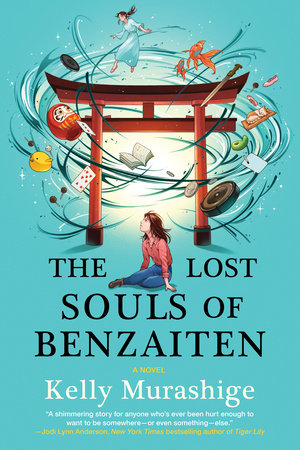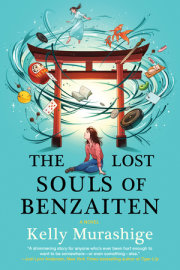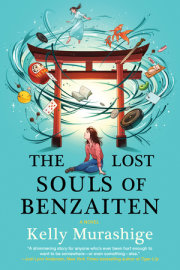Praise for The Lost Souls of Benzaiten
Winner of the HONOLULU Book Award for Author Under 35
Selected for the Children's Book Council Young Adult Favorites Award
Finalist for the Mythopoeic Fantasy Award for Young Adult Literature
New York Public Library’s Best Books for Teens 2024
“[A] novel about trauma, mental health, and understanding how many ways a person who doesn’t speak can still communicate . . . While the story frequently feels so grounded in reality, and in the struggles of coping—and of wanting to cope—that come with losing friends and loved ones, that makes the divine elements feel even more whimsical and dazzling.”
—Paste Magazine
“It would be so easy to say that The Lost Souls of Benzaiten is a good read because it is thoughtful and intelligent and also, on more than one occasion, quite funny . . . But this book, and Machi’s story, is SO MUCH MORE! . . . The Lost Souls of Benzaiten is a surprise; a truly lovely reading experience that I recommend most strongly to anyone who has ever been lost in a whirlwind and needs a gentle hand to lead them back.”
—Locus Magazine
“Kelly Murashige offers a new voice that speaks above the silence, unafraid to delve into the painful realities of teenage struggles, and with a touch of fantasy, offers a bit of magical thinking . . . and continues to keep us captivated.”
—Nichi Bei News
“For readers who love mental health narratives, takes on Japanese mythology, and a bent of quirk, this will be one to have on your TBR.”
—Book Riot
“A hopeful story.”
—Los Angeles Book Review
“Tenderly told and vividly imagined, The Lost Souls of Benzaiten shines with originality and empathy. A stunning debut.”
—Sarah Suk, author of The Space between Here & Now and Made in Korea
“A shimmering story for anyone who’s ever been hurt enough to want to be somewhere—or even something—else, Kelly Murashige’s vulnerable, magical tale chronicles the sweetness that can draw us back into the world and toward each other, even after our hearts are broken.”
—Jodi Lynn Anderson, New York Times bestselling author
“A poignant, powerful character study. Murashige has crafted a novel that, for all its metaphysical questions, finds its answers in examining the little moments in life: the thousand tiny things that shatter and shape the human spirit.”
—Zack Smedley, award-winning author of Deposing Nathan
“Kelly Murashige's beautiful first novel glows with raw emotion. Her nuanced portrayal of Machi, a girl who no longer speaks after a heart-wrenching friendship trauma, is expertly illuminated with a dreamy touch of magic. The Lost Souls of Benzaiten is a stunning and poignant debut.”
—Brianna Bourne, Carnegie-nominated author of The Half-Life of Love
“Murashige brilliantly captures the specific sense of anguish that stems from the first time a friend breaks your heart. A new take on contemporary fantasy that will leave you glancing down at your well-vacuumed floor and wondering: Is my Roomba lonely?”
—Jeff Bishop, author of A Heavy Dose of Allison Tandy
“A thought-provoking deep dive into self-awareness and the power of human connection. For anyone who has lost their way, The Lost Souls of Benzaiten offers a beacon of light and hope in the darkness.”
—Robin Reul, author of Where the Road Leads Us and My Kind of Crazy
“A breathtaking journey from sorrow to solace through worlds both magical and mortal, this book is unlike anything I’ve ever read. A powerful, uplifting antidote for anyone who has ever experienced feelings of depression or despair.”
—Susan Azim Boyer, author of The Search For Us and Jasmine Zumideh Needs a Win
“A totally original tale about the friendships that make and break us.”
—Lisabeth Posthuma, author of Baby & Solo
“Murashige’s debut YA novel inventively weaves Japanese mythology and dark humor with themes of mental health, selective mutism, teen friendship dynamics, and connection in unlikely places.”
—Booklist
“Written with tenderness and vivid emotion . . . The story takes a compassionate and introspective approach to emotional trauma in the wake of a codependent friendship. As a narrator, Machi is appealingly wry, expressive, and self-aware.”
—Kirkus Reviews
“Heartfelt and original . . . Murashige’s fresh blend of Japanese mythology and frank depictions of mental health challenges rendered via simple prose allow readers to relate to Machi’s emotions and struggles and gain new perspective into the complexity of human nature.”
—Publishers Weekly








